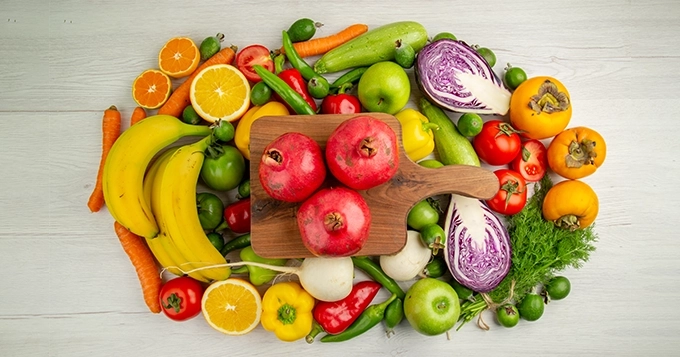In our busy modern lives, the importance of a healthy and balanced diet can sometimes be overlooked. However, recent studies have shown that aligning our eating habits with the natural rhythms of the seasons can have a positive impact on our overall health.
This article explores the benefits of seasonal eating.
Nutrient Density
Why is it important to eat the seasons produce?
One of the main advantages of seasonal eating is that fresh, seasonal produce is very nutrient-dense. Nutrients are lost when produce has to travel distances. When fruits and vegetables ripen naturally during a specific season, they contain higher levels of important vitamins, minerals, and antioxidants. Eating these foods at their peak ensures that you get the maximum nutritional benefit, which can lead to a stronger immune system, increased energy levels, and better overall health.
Environmental Impact
Eating seasonally is also in line with environmentally conscious practices. When we consume fruits and vegetables that are in season, we tend to choose produce that requires fewer artificial inputs like pesticides and fertilizers because these items are often grown using more natural and sustainable farming methods. Additionally, the reduced need for long-distance transportation decreases the carbon emissions associated with food production and distribution. By embracing seasonal eating, individuals can make a positive impact on the environment and contribute to sustainable food practices.
Supporting Local Agriculture
Another benefits of seasonal foods is that it often involves supporting local farmers and the local economy. When you choose to buy fruits and vegetables that are in season, you are more likely to buy produce that is grown nearby. This reduces the carbon footprint produced by long-distance transportation and helps to support local agriculture. By doing so, you contribute to a more sustainable and resilient food system.
Variety in Diet
Eating fresh produce picked at harvest provides the highest nutritional value due to optimal growing conditions and temperature. These fruits and vegetables are less likely to undergo transportation, storage, or artificial ripening, resulting in higher vitamin, nutrient, and antioxidant content. For example, fall-grown broccoli has nearly double the vitamin C content compared to spring-grown broccoli.
Consuming a variety of fresh fruits and vegetables is crucial to reducing the risk of chronic diseases like diabetes, heart disease, and cancer. Adding various colorful fruits and veggies to your diet can improve immunity by providing a greater number of vitamins and minerals.
Culinary Creativity
Trying out new recipes and flavors with the different fruits and vegetables that are in season is a fun and creative way to eat. By choosing produce that is available during each season, we can discover new tastes and expand our meal options. This not only adds excitement to our diets but also broadens our culinary horizons.
So, when you plan your next meals, consider using seasonal fruits and vegetables and see how they can improve your taste buds, wallet, and overall well-being.
Balance and Harmony
Our bodies naturally adapt to the changing seasons, and consuming foods that align with these cycles can promote a sense of balance and harmony.
In the summer, your body craves cooling fruits, while in the winter, you tend to prefer hearty root vegetables. By embracing seasonal eating, you can honor these natural cycles and support your biological needs. This balance can lead to improved digestion, enhanced energy levels, and a heightened sense of well-being. By listening to your body and choosing foods that are in harmony with the seasons, you can cultivate a deeper connection to nature and your own health.
Conclusion
Eating for the seasons is not just a trend, but a holistic approach to promoting health, supporting local communities, and caring for the environment. By choosing foods that are in season, individuals can enjoy fresh, nutrient-dense produce while also making a positive impact on the planet.
This approach can help individuals nourish their bodies with the best possible produce while also contributing to a more sustainable future. So, the next time you plan your meals, consider incorporating seasonal eating into your lifestyle for a healthier and more sustainable tomorrow.









